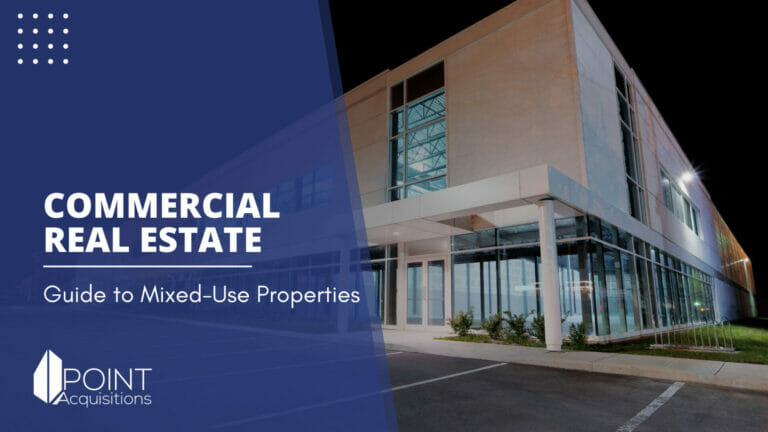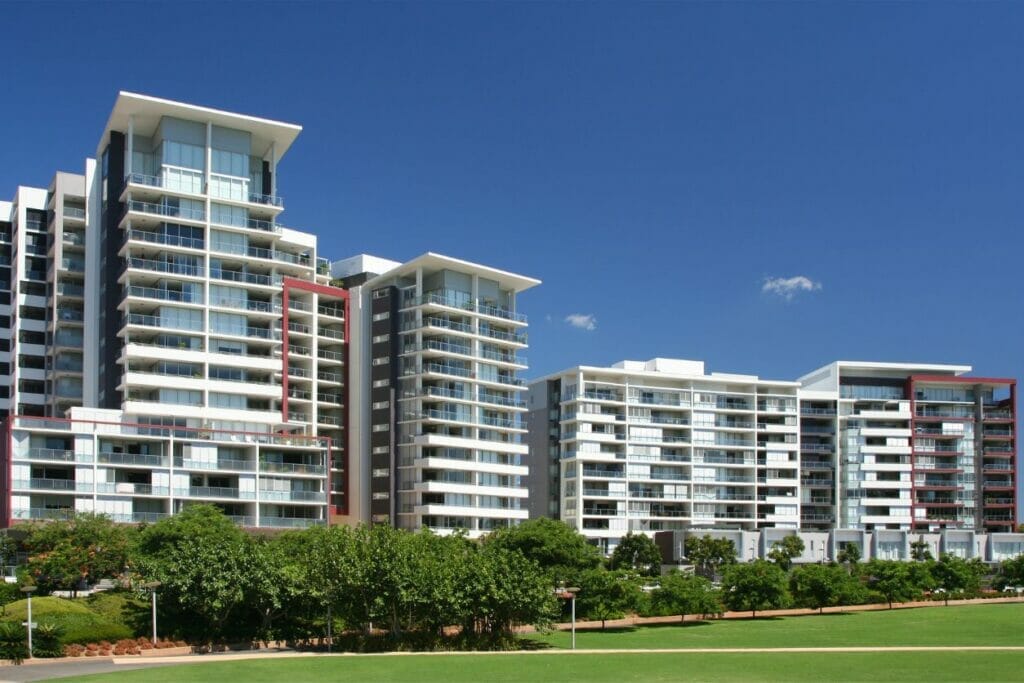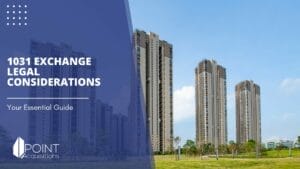
Your Guide to Mixed-Use Properties in Commercial Real Estate
If you’re looking to diversify your investment portfolio or break into the world of commercial real estate, understanding the fundamentals of mixed-use properties is a crucial first step. These versatile real estate assets have gained immense popularity in recent years, blending residential, commercial, and often retail spaces into a single development.
This blog will identify the key aspects of mixed-use properties, from their unique advantages to potential challenges, helping you confidently navigate this dynamic sector of the commercial real estate market.
Whether you’re a seasoned investor or a newcomer to the field, this guide will equip you with the knowledge needed to make informed decisions in this ever-evolving industry.

Table of Contents
What Is A Mixed-Use Property?
A mixed-use property combines commercial, residential, and sometimes industrial units within a single development. These properties often include complementary elements, like a hotel integrated with retail stores or an apartment complex near restaurants.
This versatile approach to real estate maximizes space utilization and fosters vibrant, multi-purpose communities. Investors and developers find mixed-use properties attractive for their potential to create synergies between different types of spaces, offering a diverse range of income streams and enhancing the overall value of the investment.
What are the Types Of Mixed-Use Property
Potential investors in mixed-use properties have diverse options to consider. These properties can vary greatly, from urban developments combining residential apartments with ground-floor retail spaces to suburban complexes integrating office buildings with recreational facilities. Here are some mixed-use development examples:
Main Street
Situated in the heart of a town, main street properties are historic and combine residential units on upper floors with ground-floor commercial spaces, creating a synergy that attracts a steady flow of foot traffic. Their central location and unique charm make them enduring assets, often with rising property values.
As some of the oldest examples of commercial mixed-use real estate, they offer a blend of history and modern functionality, making them attractive investments for those seeking a stable income stream and potential long-term appreciation.
Live/Work
Live-in commercial properties offer unique advantages for both investors and occupants. These properties facilitate a seamless work-life balance, as tenants reside and operate their businesses in the same building. They offer convenience and cost-efficiency when configured with businesses on the ground floor and apartments above.
For entrepreneurs, this setup allows for proximity to their workspace, enhancing productivity. It can also encourage collaboration when business partners reside adjacent to their workplace. This integrated lifestyle can lead to reduced commute times, increased efficiency, and a stronger sense of community within the property.
Residential And Office
A residential and office commercial property featuring a harmonious blend of office and residential units offers several distinct advantages. Primarily designed as a commercial building with multifamily residential units, it promotes a dynamic live-work environment.
This arrangement enhances convenience for business owners and employees while capitalizing on space efficiency. Residents benefit from easy access to workspaces, reducing commute times and fostering work-life balance.
For investors, this combination diversifies income sources, mitigates vacancies, and enhances the property’s overall appeal, making it a compelling and versatile real estate investment.
Mixed-Use Hotels
Mixed-use hotels offer enticing investment opportunities. These developments typically incorporate a hotel, fitness center, retail area, and dining/entertainment options, creating a vibrant ecosystem that attracts diverse patrons.
This blend of amenities enhances the hotel’s profitability and increases foot traffic, benefiting the entire property. Investors can tap into various income streams, from hotel room bookings to retail rents, and capitalize on the synergies between different components.
In a competitive market, mixed-use hotels can be a strategic and lucrative investment in the commercial real estate landscape.

Why are Mixed-Use Commercial Properties In Demand?
Investing in mixed-use commercial properties offers numerous financial benefits. These advantages drive strong demand among investors seeking stable returns and long-term growth potential, making mixed-use properties a highly attractive commercial real estate market segment. The following are the benefits of mixed-use developments:
Pedestrian friendly
The pedestrian-friendly nature of mixed-use commercial properties is a significant draw for investors. Walkability is a key advantage, as it aligns with the preferences of many Americans, especially millennials, who prioritize living in neighborhoods where they can easily stroll to restaurants, shops, and amenities.
This accessibility boosts property values and enhances the overall appeal to tenants and customers. Investors recognize that creating vibrant, walkable communities can translate into steady demand and increased profitability, making mixed-use properties an attractive choice in the commercial real estate landscape.
Consumer trends
From an investment perspective, consumer trends have become a driving force behind the surging demand for mixed-use commercial properties.
For example, as consumer behavior has evolved, millennials’ strong preference for urban living, with a focus on walkability and access to public transit, has fueled the appeal of these properties. Simultaneously, baby boomers are transitioning from their suburban lifestyles to embrace the convenience and amenities of mixed-use developments.
Recognizing these trends, investors are increasingly drawn to mixed-use properties, capitalizing on the evolving preferences of these key demographic groups and the potential for sustained, profitable investments.
Housing Needs
The surge in demand for mixed-use commercial properties is closely tied to evolving housing needs. A US Census Bureau report from 2017-2021 shows that over 35% of Americans opt to rent their homes, thus raising the demand for apartments.
Residential mixed-use developments cater to this demand by offering renters practical, space-efficient living options. These properties seamlessly integrate living spaces with retail and commercial amenities, providing convenience and accessibility.
As renters seek dynamic, urban environments, mixed-use apartments meet their housing preferences, making them an attractive investment choice and fueling the growth in demand for such properties.
Advantages for retailers
For retailers, investing in commercial real estate within mixed-use properties presents distinct advantages, especially in the face of e-commerce growth and COVID-19 challenges.
These properties, often featuring apartments above commercial spaces, create a built-in customer base and boost foot traffic. This arrangement enhances customer access and visibility, helping retailers thrive in a changing retail landscape.
Amidst shifting consumer habits and the need for more resilient business models, mixed-use properties offer retailers a strategic and appealing investment opportunity to navigate evolving market dynamics.

What are the benefits of mixed-use properties?
Mixed-use developments offer a multitude of benefits:
- A diverse tenant market in mixed-use properties brings a variety of occupants, fostering vibrant, engaging communities. This diversity creates interesting neighborhoods and bolsters property values, making these investments more attractive and dynamic.
- Additionally, investing in mixed-use commercial properties offers reduced risk for investors by diversifying your real estate portfolio across property types. This diversity makes it a safer investment, as losing one tenant has a lesser impact. Additionally, high demand in this market further diminishes risk.
- Furthermore, mixed-use developments offer the advantage of convenience. With easy access to public transportation, shops, workplaces, and dining options, these properties provide a highly convenient environment for consumers, enhancing their appeal and potential for long-term success.
- There are various benefits to sustainability if you are considering investing in a mixed-use commercial property. These compacted developments conserve land and resources while improved walkability reduces pollution, making them eco-friendly choices for residents and businesses, aligning with the growing emphasis on sustainable real estate practices.
What are the disadvantages Of Mixed-Use Property?
Investing in mixed-use developments comes with occasional risks and challenges. Careful planning and effective property management are usually enough to mitigate these challenges and ensure a successful investment. However, there are additional factors to consider:
- Developing a mixed-use property can be challenging due to its complexity, often taking a year or longer to complete. Poorly planned projects can lead to conflicts among different property components, necessitating thorough planning and execution to ensure success.
- Mixed-use properties could be harder to manage due to the more intricate planning usually required when involving various property types. This may require multiple property managers with specialized expertise, making coordination and efficient management more intricate.
- Investors should be cautious about additional upfront costs when managing mixed-use properties in commercial real estate. These properties often require substantial initial investments, and profits may be limited if they cannot attract new tenants and customers, making it essential to weigh the potential return on investment carefully.
- Investing in mixed-use commercial developments can be challenging when finding appropriate financing and loan options. It often takes more work to secure a lender, especially in smaller markets, making financing a potential obstacle for investors in these projects.
Why is Mixed-Use Zoning Important?
Multi-use zoning, often called mixed-use planning, holds significant importance as it allows for integrating various property types within a single development. This significance can be observed across three main categories of mixed-use zoning:
First, horizontal developments combine single-use properties like apartments, businesses, and retail stores within the same block, fostering synergy between different functions.
Second, vertical developments incorporate diverse property types within one building, maximizing space usage, such as retail stores on lower levels and apartments above.
Finally, walkable developments encompass horizontal and vertical approaches, promoting ease of movement within the community and creating vibrant, pedestrian-friendly neighborhoods.
Mixed-use developments are crucial in bringing these mixed-use zoning concepts to life and developing well-rounded and dynamic urban environments.

What’s the difference between a mixed-use property and a mixed-commercial property?
Mixed-use properties encompass a blend of residential and commercial components, combining residential units, retail spaces, offices, and parking areas within a single development. For instance, an apartment complex with integrated retail stores and businesses illustrates this concept.
On the other hand, mixed-commercial properties entail integrating different types of commercial properties, combining office spaces, industrial facilities, and retail stores within a single area. While mixed-use properties focus on a broader mix of residential and commercial elements, mixed-commercial properties primarily revolve around various commercial components.
How To Invest in Mixed-Use Property
To invest in mixed-use properties, define your investment strategy, whether rental or development projects. Search for properties through market listings or explore off-market commercial properties for a wider selection and potential cost savings. Real estate agents or online platforms can assist in finding both on and off-market listings. Identify a property that aligns with your interests and budget. Finally, negotiate with the seller to establish mutually agreeable terms and prices.
About The Author

Jesse Shemesh
Disclaimer
Please note that Point Acquisitions is not a tax expert or tax advisor. The information on our blogs and pages is for general informational purposes only and should not be relied upon as legal, tax, or accounting advice. Any information provided does not constitute professional advice or create an attorney-client or any other professional relationship. We recommend that you consult with your tax advisor or seek professional advice before making any decisions based on the information provided on our blogs and pages. Point Acquisitions is not responsible for any actions taken based on the information provided on our blogs and pages.
1031 Exchange Capital Gains Tax Deferral
According to a 2021 report by the National Real Estate Exchange Services (RES), over 240,000 1031 exchange transactions were completed in the United States, totaling $100 billion. This impressive figure underscores the role of 1031 exchanges in the real estate…
Read More1031 Exchange Benefits
As of Q4 2023, the national vacancy rate for all commercial property types in the United States sat at 9.2%, according to CBRE’s latest insights and research. This represents a slight decrease compared to the previous quarter and suggests a…
Read More1031 Exchange Legal Considerations: A Must-Read Guide
You’re in the right place if you’re considering a 1031 exchange for your commercial real estate investments. Whether you’re a seasoned investor or just dipping your toes into the market, understanding the legal landscape of 1031 exchanges is key to…
Read More

